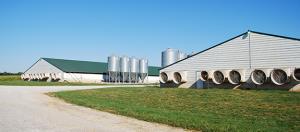 The United States Supreme Court refused to hear a nuisance case, letting stand an Indiana Court of Appeals ruling upholding the constitutionality of the state Right to Farm Act. Himsel v. Himsel resulted from a family of landowners establishing a hog operation that plaintiffs alleged created a nuisance and devalued their property. The plaintiffs challenged the constitutionality of the Indiana Right to Farm Act claiming that the statute was unconstitutional as it violated the Open Courts Clause and the Takings Clause of both federal and state constitutions.
The United States Supreme Court refused to hear a nuisance case, letting stand an Indiana Court of Appeals ruling upholding the constitutionality of the state Right to Farm Act. Himsel v. Himsel resulted from a family of landowners establishing a hog operation that plaintiffs alleged created a nuisance and devalued their property. The plaintiffs challenged the constitutionality of the Indiana Right to Farm Act claiming that the statute was unconstitutional as it violated the Open Courts Clause and the Takings Clause of both federal and state constitutions.
The Indiana Appeals Court ruled for the defendant stating that it was not necessary for the farmers to prove that their specific hog farm would not have been a nuisance in 1941 when crop operations were established but only that hog farming in general would not have been a nuisance.
 The Indiana court recognized that plaintiffs erected homes on agricultural land in continuous use since 1941. With respect to a negligence claim, the court found no evidence that the operation was managed in a negligent manner or in violation of state regulations. The Indiana Appeals Court affirmed the constitutionality of the Indiana Right to Farm Act. Since the alleged odor did not amount to a substantial impairment of the use of residential property and the plaintiffs were not deprived of all or a substantially large proportion of the economic value of their properties, the court ruled that the Takings Clause of the Indiana and U.S. constitutions were not applicable. Right to Farm Acts have been enacted in all fifty states offering an affirmative defense to farmers facing nuisance lawsuits.
The Indiana court recognized that plaintiffs erected homes on agricultural land in continuous use since 1941. With respect to a negligence claim, the court found no evidence that the operation was managed in a negligent manner or in violation of state regulations. The Indiana Appeals Court affirmed the constitutionality of the Indiana Right to Farm Act. Since the alleged odor did not amount to a substantial impairment of the use of residential property and the plaintiffs were not deprived of all or a substantially large proportion of the economic value of their properties, the court ruled that the Takings Clause of the Indiana and U.S. constitutions were not applicable. Right to Farm Acts have been enacted in all fifty states offering an affirmative defense to farmers facing nuisance lawsuits.
Perhaps the most significant litigation currently in progress relates to the nuisance claims against Smithfield Foods in North Carolina. A series of verdicts against the company have been handed down by juries that awarded damages to plaintiffs alleging odor from disposal of hog manure using retention lagoons and spraying liquid waste on fields. All the cases are currently on appeal.